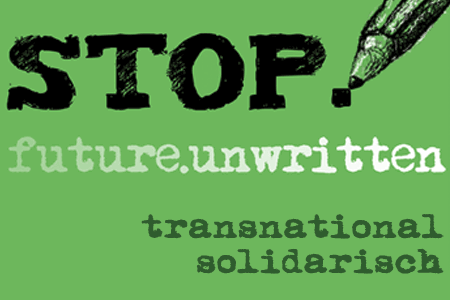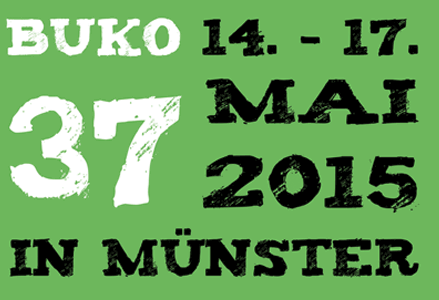Anti-racist politics in a transnational perspective
On the one hand a massive walling-off of nations and whole continents is taking place, behind the border we observe a simultaneous proclamation of open-mindedness and a culture of welcome: We want to ask questions that are concerned with the analysis of the political situation of global migration movements as well as creating a platform for the many antiracist movements for coming together and discussing possibilities for cooperation.
Complex tasks and links are apparant for the anti-racist struggles for freedom and against the foreclosure regime of the European Union. The death of refugees in the Mediterranean and in the EU's external borders and the responsibility of European institutions are a fact. Nevertheless, the European Union strenghtens their foreclosure policy. The EU's external borders are even more upgraded, expanding the power of border protection agency Frontex. Joint police operations work out racial profiling on high level. There are camps for example in Spain who have the function to catch migrants and bring them back to the other site of the border and leave them to their own fate. At the same time Germany recognizes more countries such as Serbia, Montenegro and Macedonia as safe countries of origin.
What links between the individual struggles arise?
At the same time, much of the migration is intra-continental. There are, for example, much more migrants in Africa than in Europe and currently many refugees from Syria to Jordan and Turkey.
How are movements here connected with people in other countries, what can we learn from each other? Which interconnections between anti-racist work and radical critique of global dominance and exploitation arise? What are the links with other social movements in relation to global causes of flight as political conflicts, impacts of climate change and economic exploitation in a world characterized by (neo-) colonialism?
Even if people have made it to a supposedly safe place, their life is often characterized by discrimination and insecurity of institutional and everyday racism. Residential obligation, isolating accomodation, no working permit, racist authorities, illegalization and the constant fear of deportation lead to isolation and make a self-determined life impossible.
At the same time, the existing racist and (post-) colonial structures and practices, such as everyday discrimination, right extremist movements like PEGIDA, racist attacks and racial profiling not only affect migrants, but all the people who are defined as 'different' in accordance to a white dominant society shaped by colonialist thoughts of supremacy.
But instead of actually deal with (post-) colonial power structures, often a so-called "Welcome-culture" is propagated. In Münster we experience a city that wants to represent itself as an open and helpful society. "We love diversity" is the headline. All this euphoria cannot make up for structural as well as everyday racism, even by joining demonstrations against PEGIDA or voluntary engagement.
What are the options of protest and anti-racist interventions in order to criticize and fight (post-) colonial structures and racism? How can existing protests and struggles against structural racism be continued and at the same time a radical critique of borders and nations and the demand for freedom of movement be carried on?
In addition to long-existing self-organization, a lot of new refugee-initiative have been formed over the last years. There have been protests in many cities in Germany and in other European countries. There were occupations, hunger strikes, several protest marches and cross-border networks like the protest march to Brussels or the International Refugee Conference in Rome. There are serveral groups stopping deportations with actions of civil disobedience. While there was a growing movement of refugees, there was also massive repression, repeated stalling tactics by politicians and defamation of the movement. What we face now is the attempt of the German government to change asylum law to criminalize refugees who are politically active and fighting for their rights.
After all the exhausting struggles of recent years - where is the movement today? How can the struggles in different countries be further connected and the protest against the European border regime be organized more transnationally?
How do anti-racist motivated people support the struggles? What are the possibilities in supporting refugees? What contradictions arise? How far have (post-) colonial hierarchies been made conscious? Were paternalistic structures overcome or not?
What have the movements learned in the past few years and how can these experiences be used? How can transnational solidarity and common practice of resistance look like?
The BUKO Congress will be a forum for reflection of one's own practice and for political exchange and networking. Let us oppose to the policy of isolation of the border regime with a transnational practice of resistance!






